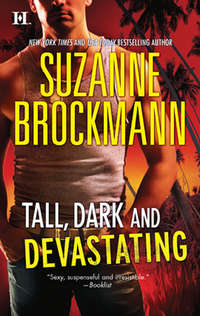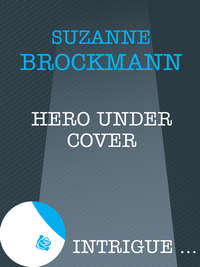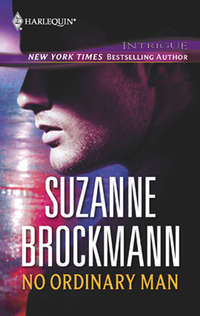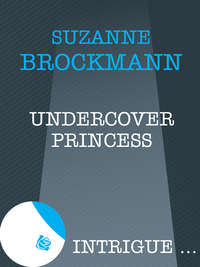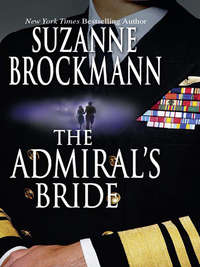
Полная версия
Hero Under Cover
“We’ve got to put this in the safe,” Annie said, gesturing to the package in her arms.
“Annie, who was that on the tape?” Cara asked, eyes narrowing.
“Some crackpot,” Annie said, heading back to the sturdy vault that sat directly in the middle of the house, surrounded by the lab in the front and the office in the rear. It was secure, impenetrable. She would feel a lot better after she locked the gold death mask inside.
“If it was just some crackpot,” Cara demanded, “why did you rush across the room and lock the door?”
Annie opened the innocuous-looking closet door to reveal the combination lock of the big safe. She spun the red dial several times before entering the numbers. “Because it would be foolish not to take precautions, crackpot or not.” She looked up at her assistant. “You must not have had a chance to read the background info I left you on this project.”
Cara shrugged expansively. “I cannot tell a lie. I had about an hour of free time last night, and I spent it watching ‘Quantum Leap’ instead of reading about nineteenth-century Indian chiefs.”
Setting the package on the top shelf of the vault, Annie swung the door shut, locking it securely. “Native Americans, not Indians,” she corrected Cara. “In a nutshell, the artifact we’re testing for authenticity is supposedly a gold casting of a death mask of a Navaho named Stands Against the Storm. He was one of the greatest Native American leaders. He was a brilliant man who truly understood Western culture. He tried to help the white leaders understand his own people as thoroughly.”
Cara followed her back into the office. “How come I’ve never heard of him?” she asked. “I mean, everyone knows Sitting Bull and Geronimo. Why not this guy?”
Annie sat down behind her desk, frowning at the chaos on its surface. Why was it that paperwork seemed to multiply whenever she went away for a few days? “Sitting Bull and Geronimo were warriors,” she said. “Stands Against the Storm was a man of peace. He didn’t get as much press as the war party leaders, but not from lack of trying. In fact, he was in England, trying to drum up support for his people among the British, when he died.” She shook her head. “His death was a major blow to the Navaho cause.”
“If Stands Against the Storm was such a peaceful guy,” Cara said, “then why would he have an evil spirit?”
“The Navaho believe that when people die, they become ghosts or spirits,” Annie said. “It doesn’t matter how nice or kind a person was during his life. When he dies, he becomes malevolent and he gets back at all the people who did him wrong during his lifetime. Chances are, the nicer the guy was, the more evil his spirit would be—the more he’d have to avenge. You know, nice guys finish last and all that.”
“But if Stands Against the Storm died in England,” Cara said, “then how could his spirit come after you? Assuming for the sake of this discussion that the Navaho are right about this spirit stuff,” she added.
“Death is a major problem for the Navaho,” Annie said. She smiled. “Actually, I can’t think of too many cultures that look forward to death, but the Navaho really don’t like it. In fact, if someone dies inside a house, even today, that house will sometimes be abandoned. See, the Navaho believe that the place a person dies in, and the things he touches before dying or even after he’s dead, can contain his bad spirit. Making a death mask would be a real invitation to disaster. The Navaho would never make something like a death mask. But it was the custom at the time in England, you know, to make a mold of the dead person’s face and then cast a mask from it to get a likeness. I guess Stands Against the Storm was something of a celebrity—and certainly a curiosity, a Red Indian from the Wild West—so when he died, they made a death mask.”
Annie looked over at the answering machine. What she couldn’t figure out was how it had become public knowledge that she was working on authenticating Stands Against the Storm’s death mask. Unless Ben Sullivan, or Steven Marshall, the purchaser, had leaked something….
“Hey, Annie?”
She met Cara’s worried brown eyes. “It just occurred to me,” the taller woman said. “That message on the answering machine is basically a…Well, it’s a death threat.”
“It was just some nut.” Annie shrugged it off. “Besides, I don’t believe in ghosts.”
“You gotta admit, it’s creepy,” Cara said. “Maybe we should, I don’t know…Call the police?”
Annie groaned, dropping her head onto her arms on the desk top. “No more police, no more FBI, no way. I’d much rather be haunted by the spirit of Stands Against the Storm.”
ANNIE SAT UP IN BED, WIDE-EYED in the darkness as the burglar alarm shrieked.
Her heart pounded from being awakened so suddenly. She clicked on the light and grabbed her robe. Oh, Christmas! This damned alarm was going to raise the entire neighborhood.
She ran down the stairs two at a time and turned on the lights in the foyer as she crossed toward the alarm-system control panel.
Oh my God, thought Annie. It wasn’t a malfunction! The alarm schematic showed a breach in the system on the first floor. A window in the lab was marked as the intruder’s point of entry.
Suddenly she was very glad for the shrieking alarm. Across the street, she could see the neighbors’ lights go on, and she knew they’d call the police—they always did. She ran back up to her room and opened the drawer on her bedside table. Oh, damn, damn, damn, where was it?
She pulled the drawer out of the table and emptied it onto her bed. There it was.
She grabbed the toy gun, unwinding a stray piece of string from the barrel, and headed toward the stairs. She ran down and kicked open the door to the lab. She flicked on the light switch with her elbow and the bright fluorescent bulbs illuminated the room.
No one was there—either human or inhuman.
But the window had been broken.
Feeling just a little silly, she put the plastic gun down on the lab counter and stepped carefully toward the large rock that had been thrown through the window. There was a piece of paper attached to it with a rubber band.
Spinning lights from two police cars caught her eye as they pulled into her driveway. She went to the front door and keyed into the control panel the code to cancel the alarm. The shrill noise stopped instantly. Taking a deep breath, she opened the door to the town police officers.
They came inside and looked at the broken window. One of them made a quick survey of the house, checking to make sure all the windows and doors were still locked, while the other radioed in to the station.
Big doings in a small town. Annie sighed. She went into the kitchen and put on a pot of coffee. Something told her this was going to be a long night.
PETERSON WOKE UP INSTANTLY and answered the phone after only one ring.
“Yeah,” he said, looking at the glowing numbers of his clock: 3:47. He ran one hand across his face. “This better be good.”
“It’s Scott. Can you talk?” Whitley Scott said in his flat New Jersey accent.
“Yeah, I’m awake,” Pete said, sitting up and turning on his light.
“No, I mean…are you alone?”
“Yeah, I’m alone.” Pete rubbed his eyes. “If you check my file, you’ll see that I haven’t been involved with anyone since last March.”
“I’ve already checked your file,” the FBI agent said easily. “And it says you’ve got something of a reputation as a tomcat.”
Pete was silent, thinking about that new administrative assistant in the New York City office. Carolyn something. She had curly brown hair and legs a mile long. And eyes that made it more than clear that she was interested in him, no-strings-attached. She’d invited him out for a drink last night. If he had gone with her, she’d probably be lying here right now, next to him.
But he’d turned her down.
Why? Maybe because, regardless of the fact that he’d be using her the exact same way, he was tired of being the flavor of the month for ambitious, upwardly mobile women.
Even though he wasn’t overly tall, he knew that with his black hair and his dark brown eyes, he had the dark and handsome part down cold.
For years, he’d used his good looks to his advantage, but recently it had been rubbing him the wrong way. His relationships, which usually lasted a month or two, were getting shorter and shorter. And when he’d looked at that administrative assistant last night, he hadn’t felt the usual heat from knowing that she wanted him. If he’d felt anything at all, it had been disdain.
More than once over the past few months, the thought of retiring from the agency had crossed his mind. The closer he got to his fortieth birthday, the more aware he seemed to become of an emptiness in his life.
He couldn’t figure out what he was looking for. He was far too jaded to believe in true love—hell, he was too jaded to believe in any kind of love. And if he stopped having relationships based on animal attraction, on sex, he was in for a whole lot of cold, lonely nights….
“You still there?” Whitley Scott asked.
“Yeah.”
“We’ve found a way for you to get close to Anne Morrow,” Scott said. “She practically handed it to us on a platter.”
Pete listened intently as Scott explained. It would work. It would definitely work.
After he hung up the phone and turned the light off, Pete stared up at the dark ceiling, feeling a wave of anticipation so charged that it was almost sexual. In a sudden flash of memory, he saw black lace against pale skin, and a pair of wide, blue eyes….
“THE NOTE SAID WHAT?” Cara’s voice rose sharply.
“It was stupid,” Annie said, clearing some of the clutter off her desk. “I can’t believe the police took it seriously.”
“When someone bothers to send a message via a rock through a window,” Cara said tartly, “it should probably be taken seriously.”
“But, God, did they have to notify the FBI?” Annie said. “You know, the Federal agents got over here really quickly. I’m wondering if they weren’t somehow responsible. I mean, they’ve been hassling me every other way imaginable. Why not a rock through a window?”
“With a note saying ‘Prepare to die’?” Cara asked. “I doubt it, Annie.”
“And I seriously doubt that a Native American group, no matter how radical or fringe, would resort to this kind of petty threat,” Annie said. “The FBI can go ahead and investigate, but they’re just wasting their time.” She sat back in her chair, her normally clear blue eyes shadowed with fatigue. “I just don’t need the FBI’s garbage on top of everything else. You know, they wanted to provide me with round-the-clock protection. Surveillance is more like it. I told them I could protect myself perfectly well, thank you very much.”
“I don’t suppose you told them that the likeliest suspect is a ghost called Stands Against the Storm,” Cara said. “Maybe we should’ve called Ghostbusters instead of the police.” She sang the familiar horn riff to the original movie theme.
Annie laughed, searching for something on her desk to throw at her friend. She settled for an unsharpened pencil.
Cara dodged the pencil and grinned. “Of course, if a ghost isn’t a freaky enough suspect, there are always Navaho witches.”
Annie tiredly closed her eyes. “I see you finally read the background information I gave you.”
“‘Quantum Leap’ reruns weren’t on last night,” Cara said. “So I had some free time. Fascinating stuff. I particularly liked the part that said the Navaho believe some people—who appear to be normal during the day—are really witches. And if plain old witches who can cast spells and wreak havoc aren’t bad enough, these witches can transform themselves into giant wolves at night and roam the countryside. Very pleasant.”
“Most cultures have some version of bogeymen that stalk the night,” Annie said. “Werewolves are nothing new.”
“Yeah, but these werewolves are neighbors, relatives even,” Cara said. “And they start doing their witchy business when they get jealous of another person’s wealth or good luck or—Hey, that’s it.” Cara grinned. “Call the FBI off. I’ve figured it out. Alistair Golden is really one of these witches, and he’s cast horrible bad-luck spells on you because you’re starting to steal away some of his business. Although, actually he’d make a better weasel man than a wolf man.”
“There’s a big hole in your theory,” Annie said. “Golden’s not Navaho.”
“Good point.” Cara’s eyes narrowed, taking in the pale, almost grayish cast to her friend’s face. “The guy fixing the window won’t be done for another hour or so,” she said. “Why don’t you go upstairs and take a nap? I can hold down the fort.”
The phone rang.
“That’s got to be my call from Dallas,” Annie said. “I called Ben Sullivan but he’s out of touch for a while. He’s on a dig in Turkey, so my contact for the death mask is the buyer, Steve Marshall.”
Cara picked up the phone. “Dr. Morrow’s office. MacLeish speaking.” She listened for a moment, her eyebrows disappearing under her bangs. “One moment, please,” she said. She covered the speaker with her hand as she gave the handset to Annie. “What, are you clairvoyant, now, too? It’s Steven Marshall. Calling from Dallas.”
Annie smiled wanly as she took the phone. “Hello?”
“Dr. Morrow,” came the thick Texas drawl. “My secretary tells me you’ve been trying to reach me?”
“Yes, Mr. Marshall,” Annie said. “Thanks for getting back to me so quickly. We’re having a little problem.”
Briefly she described both the threatening phone call and the follow-up note that had come through her window.
“I don’t think there’s any real danger,” Annie said. “But I felt I had to notify you and give you the opportunity to have the artifact authenticated by an establishment with higher security.”
There was a moment of silence. Then Marshall said, “But…you’re the best, aren’t you, darlin’?”
“Well, yes, I like to think so,” Annie said.
“I’m more concerned with your personal safety,” he said. “Are you frightened? Do you want to get out of this contract?”
“Not at all. It’s just that I may not be set up to provide security at the level necessary to protect the piece,” she explained.
“Oh, that’s just a little bitty problem,” Marshall said with the easy nonchalance of the very wealthy. “We can solve that, no sweat. I’ll provide the security, darlin’. I’ll send a man over later this afternoon. He’ll be responsible for the safety of the death mask. He’ll also act as your bodyguard.”
Oh, great, just what she needed. A pair of biceps following her around. She took a deep, calming breath. “Mr. Marshall, that’s not necessary—”
“No, no, darlin’, I insist.”
“But I’m backlogged,” Annie protested. “It’s going to be weeks before I even get a chance to look at the artifact. And the tests I need to perform will take that much time again. My contract states an estimated completion date of mid-December. That’s over two months—”
“I’ll tell the guy to be prepared to stay for a while.”
“But—”
“I gotta get back to work now,” Marshall said. “Nice talking to you, darlin’. I’ll be in touch.”
“But—”
He hung up.
“But I don’t want a bodyguard!” Annie wailed to the buzz of the disconnected line.
“A what?” Cara asked.
Annie hung up the phone with a muttered curse. “I’m going to take a nap,” she said, stalking toward the door. “Maybe when I wake up, this nightmare will be over.”
“Did you say bodyguard?” Cara’s voice trailed after her.
Annie didn’t answer.
Cara’s face broke into a wide grin. A bodyguard. For Annie. This was going to be an awful lot of fun to watch.
CHAPTER THREE
ANNIE STRETCHED, LUXURIATING, enjoying having spent the day in bed. It was a real self-indulgence, particularly since she had so much to do in the lab.
But she wouldn’t have gotten a whole heck of a lot done if she’d tried to work. Her concentration would’ve been way off because of her fatigue, and she would have ended up having to do everything over again. So instead she’d slept hard, and now felt much better. And hungry. Boy, was she hungry.
She pushed back the covers and went into her bathroom to wash her face, deciding against a shower. Why bother? Cara would be leaving for home in an hour or so. And the artifacts Annie had to run tests on didn’t care if she worked in her pajamas. She brushed the tangles out of her hair and put some moisturizer on her face.
The sky outside the window was dark, she realized suddenly. It must be later than she thought.
She went down the stairs barefoot, calling, “MacLeish! Are you still here?”
“No, she went home.”
Annie stopped short at the sight of the stranger standing in the shadows of the foyer. How did he get in? What was he doing here? Fear released adrenaline into her system and, heart pounding, she stood on the stairs, poised to turn and run back up and slam the door behind her.
He must have realized that he had frightened her, because he spoke quickly and stepped into the light. “Steven Marshall sent me,” he said, his voice a rich baritone with a slight west-of-the-Mississippi cowboy drawl. “My name’s Pete Taylor. I’m a security specialist. Your assistant let me in. She didn’t want to wake you….”
He was not quite six feet tall, with the tough, wiry build of a long-distance runner. His hair was black, and cut almost military short. His face was exotically handsome, with wide, angular cheekbones that seemed to accentuate his dark eyes—eyes of such deep brown, it was impossible to tell where the iris ended and the pupil began. His lips were exquisitely shaped, despite the fact that he wasn’t smiling. Somehow Annie knew that this was not a man who smiled often.
He held out his wallet to her, opened to reveal an ID card encased in plastic.
Annie couldn’t keep her hand from shaking as she took the smooth leather folder from him, and she saw a flash of amusement in his dark eyes. He thought it was funny that he scared her. What a jerk.
She sat down on the steps as she looked at the ID. Peter Taylor. Age 38. Licensed private investigator and security specialist. The card gave him a New York City address, in a rather pricey section of Greenwich Village. Across from the ID card was a New York State driver’s license. She lifted the plastic flaps and found an American Express Gold Card for Peter Taylor, member since 1980, a MasterCard, a Visa and a Sears credit card. He was carrying over five hundred dollars cash in the main compartment, along with several of his own business cards.
She tossed the wallet back to him and, as their eyes met, she saw another glint of humor on his otherwise stern face.
“Do I pass?” he said. As he tucked the wallet into the inside left pocket of his tweed jacket, she caught a glimpse of a handgun in a shoulder holster.
Annie nodded. “For now,” she said, working hard to keep her tone formal, polite. “But just so that it’s out in the open, I think you should know that I don’t want you here. I consider your presence an imposition, and I intend to speak to Marshall about it tomorrow. So don’t bother unpacking—you’ll be leaving in the morning.”
“When I spoke to Mr. Marshall this afternoon, he was adamant that I remain,” he said. “Apparently he’s concerned for your safety. Somehow I don’t see him changing his mind so quickly.”
Annie stared at him. His feet were planted on the tile floor, legs slightly spread, arms crossed in front of his chest. His jeans were tight across the big muscles in his thighs. His belt buckle was large and silver and obviously Navaho in origin. Annie couldn’t see it clearly, but there was a silver ring on his right hand that also looked Navaho. He wore a necklace, but it was tucked into his shirt. She would bet big money that he was at least half Native American, and probably Navaho.
“Where did you grow up?” she asked.
He blinked at the sudden change in subject. “Colorado,” he said. “Mostly.”
His shoulders stiffened slightly. So very slightly, he probably didn’t even realize it. But Annie noticed. Something about the question had made him feel defensive, wary. Was it that she’d asked a personal question, or did his wariness have something to do specifically with Colorado, or the “mostly” that followed it?
She was instantly fascinated. It wasn’t because he was outrageously handsome, she tried to convince herself. Her attraction toward him—and she was attracted, she couldn’t deny that—was more a result of his quiet watchfulness, spiced with a little mystery. He had something to be defensive or at least wary about. What was it?
“You ride horses, don’t you, Taylor?” she asked, head tilted slightly to one side as she looked at him, hooked into trying to solve the puzzle, hoping for another clue from his reaction.
She was watching him, Pete realized, studying him as if he were an artifact, memorizing every little detail, searching for his flaws and weaknesses.
Her hair was down around her shoulders, parted on the side and swept back off her face. It gleamed in the light. She wore a too-large pair of men’s pajamas, with the legs cuffed and the sleeves rolled up. There was no makeup on her face, and instead of giving her that naked, vulnerable look most women have without cosmetics, she looked clean, scrubbed and fresh.
Her eyes were a brilliant blue, and she met his gaze steadily, as if she were trying to get inside his head.
“Yeah,” he finally said.
“I figured it was either horses or a bike,” she said. “Don’t you feel odd, carrying around a gun?”
“No.”
“What do you know about death masks?” she asked.
“Not much.” She was firing off questions as if this were some kind of interview. He decided to play it her way. It might make her start to trust him. It certainly couldn’t hurt—he wasn’t going to tell her anything he didn’t want her to know.
“How about art authentication?”
“Ditto.”
“A Navaho leader from the nineteenth century named Stands Against the Storm?”
“Only the information that Marshall faxed me this morning,” he said.
“Have you read it?”
“Of course.”
She watched him thoughtfully. “Where did you go to school?”
He shifted his weight. While most people would have been loath to admit their ignorance, it hadn’t bothered him one little bit to tell her he knew next to nothing about death masks and art authentication. But this question about himself, about his background, made him uncomfortable, Annie thought. Now, why was that?
“NYU,” he said. The bio the agency had created for Peter Taylor had him attending New York University from 1973 to 1977. Truth was, he hadn’t even set foot in New York until 1980. But he’d been Pete Taylor so many times, on so many different assignments, he almost had memories of the imaginary classes….
“Are you aware that I’m currently under investigation by the FBI and the CIA?” she asked, her blue eyes still watching him.
He was caught off guard by the directness of her question and had to look away, momentarily thrown.
“They think I’m involved in some kind of international art-theft conspiracy,” she said.
He glanced up at her and saw that her lips were curved in a small smile. “Are you?” he asked.
He made a good recovery, Annie thought. He had known about the investigation. She was willing to bet he had done a full background sweep on her before coming up from New York City. It didn’t surprise her one bit. Marshall wouldn’t have hired anyone who was less than outstanding.
“Are you hungry?” she said, standing and stretching, arms pulled up over her head, ignoring his question. “I haven’t eaten all day, and if I don’t have something soon, I’m gonna die.”
Pete found his eyes drawn to the gap that appeared between her pajama top and the loose bottoms that rode low on her slender hips. “I ate already, thanks,” he said. “Besides, I have an expense account that Mr. Marshall is covering. It’s not fair that I should cost you money. After all, you don’t even want me here.”


